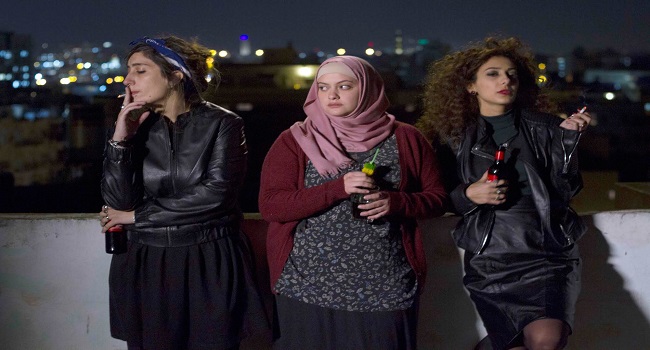
The three Palestinian women in Maysaloun Hamoud’s feature debut In Between share a small apartment in Tel Aviv, but what confines them is the world at large. They are vastly different personalities who each find themselves burdened by the societal expectations placed on them.
Laila (Mouna Hawa) is the most outspoken of the trio. A smart lawyer with a biting tongue, Laila enjoys partying at clubs and indulging in the vices that come with such activities. Her roommate Salma (Sana Jammelieh), who splits her time working as bartender and DJ, has no problem of chastising former employers who object to her speaking Arabic; her fighting spirit does not transfer over when dealing with her family who frequently try to set her up with potential husbands. By comparison to the other two, newest roommate Nur (Shaden Kanboura) lives a more modest life. A Muslim who faithfully follows her religious teachings, Nur is focused on getting her degree and keeping her fiancé happy.
As the audience spends more time with these women, and watch them navigate culture, family, politics, and relationships, the similarities in their struggles become more apparent. Though they may be living life and asserting their independence, the grip of tradition is continually a roadblock they bump against.
For Laila this means realizing that her boyfriend Ziad (Mahmood Shalabi), may not be the forward thinking modern man he appears to be. Salma’s hurdle comes in the form of parents who are more concerned with their political standing than the fact their daughter might find true love in the arms of another woman. In the case of Nur it is learning to fight back against the power dynamics that affords her fiancé Wissam (Henry Andrawes) control over every aspect of her life, despite not being the pious man the community sees him as.

In Between has been referred to as the Arabic equivalent of Sex and the City and Girls. While such comparisons will likely bring more attention to the film, as it is a film that deserves to be seen and discussed, the female empowerment in this film carries much more weight. In Hamoud’s film the stakes are greater, and the struggle for independence, equality and acceptance comes with a fair share of emotional and physical pain along the way. The women in this film live in a society governed by weak men.
Regardless of their religious views or political standings, many of the key males in this film are living lies. Their actions rarely match the words and ideals they preach. Yet the women are simply supposed to obey without question. It is no coincidence that the film starts with a shot of legs being waxed while an elderly woman doing the waxing advises the young woman that men don’t like when women talk too much.
It is in this realization that these women only have themselves and their bonds of friendship to rely on that makes In Between such unforgettable film. Hamoud constructs female characters perfectly suited for the #MeToo era. They are strong, determined and tired of living in a society ruled by the lies men tell themselves and expect others to believe.
